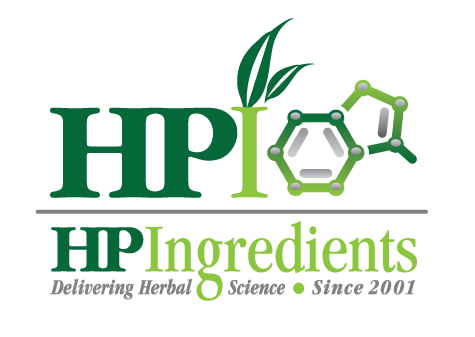Premier Ingredients
BERGAMONTE

Explore
More On Bergamonte
The History of Bergamot
Bergamot (Citrus Bergamia Risso) is a citrus plant that grows almost exclusively in the narrow coastal Calabria region in Southern Italy, due to sensitivity to the weather and soil conditions. Bergamot juice was traditionally recognized by the local population as a remedy for supporting healthy cholesterol level and cardiovascular health. The medicinal use of bergamot, forgotten for decades, is now being rediscovered.
The juice and albedo of bergamot has a unique profile of flavonoid and glycosides, such as neoeriocitrin, neohesperidin, naringin, rutin, neodesmin, rhoifolin and poncirin. Naringin have been shown to be beneficial in animal models of atherosclerosis, while neoeriocitrin and rutin have been found to exhibit a strong capacity to prevent LDL from oxidation. Importantly, bergamot juice is rich in brutieridine and melitidine with an ability to inhibit HMG-CoA reductase.
Citrus Bergamia Fruit (Bergamotto)
Patented, Standardized, Clinically Tested
Bergamonte® contains bioactive compounds of extract of the juice and albedo of Citrus bergamia Risso, standardized to >38% polyphenolic flavanoids consisting of naringin, neohesperidin, neoeriocitrin, 1% melitidin, and 2% brutieridin. Bergamonte® is produced using patented extraction technology through collaborative works of various universities and research institutions in Italy.
These flavonoids are clinically proven to help maintain healthy cholesterol levels†, healthy blood glucose level, increase HDL-cholesterol, and promoting healthy weight management.
Benefits of Bergamonte®
Citrus Bergamot Differs From C. Aurantium…
Citrus Bergamot differs from C. Aurantium because Citrus Bergamot does not contain synepherine, N-methyltyramine, and octopamine, which have been shown in research to constrict arteries, increase blood pressure, increase heart rate, cause heart-rhythm disorders, heart attack, and stroke.
Citrus Bergamot contains melitidin and brutieridin which are absent in C. Aurantium. Research has shown that these compounds significantly support healthy total cholesterol LDL, triglycerides and blood glucose levels, while increasing HDL .
Melitidine and Brutieridin In Bergamonte is made from BPF (Bergamot Polyphenolic Fraction ) Produced By H&AD SRL
A research article published in the Journal of Natural Products 2009 showed that bergamot juice contained novel compounds with statin-like properties, having the
3-hydroxy3-methylglutaric acid (HMG) bound to the naringin (melitidin) and neohesperidin (brutieridin).
These novel compounds interfere with the natural synthesis of the cholesterol pathway
in the human body: the HMG-CoA substrate interferes with the synthesis of the mevalonate acid, blocking the cholesterol production.
Superior Full-Spectrum Antioxidant ORAC Potency
in the human body: the HMG-CoA substrate interferes with the synthesis of the mevalonate acid, blocking the cholesterol production.
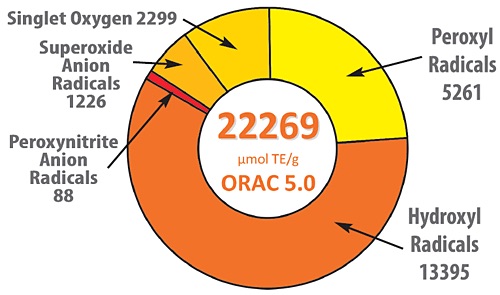
Mode of Action
Inhibiting HMG-CoA Reductase
In a study published in Journal of Natural Products July 2009, it is suggested that brutieridin and melitidin act as direct HMGCoA reductase inhibitors. HMG-CoA reductase is an enzyme linked to the liver’s cholesterol production. Melitidin and brutieridin inhibit the liver’s ability to produce LDL, resulting in reduced cholesterol levels in liver cells, which then meet their cholesterol requirements by taking up cholesterol circulating in the blood, via LDL receptors. LDL receptors break down the circulating cholesterol, resulting in healthy LDL levels in the bloodstream.
Inhibiting Phosphodiesterases (PDEs)
Bergamot flavonoids mediate their beneficial effects on lipid and glucose homeostasis by PDE4 and PDE3B modulation. PDE4 plays a critical role in cAMP (cyclic adenosine monophosphate), which regulates energy metabolism, AMPK, triglyceride hydrolysis, and glucose metabolism. PDE3B is crucial for triglyceride and cholesterol
metabolism, as well as glucose homeostasis. Dysregulation of PDE3B can cause development of fatty liver, common in metabolic syndrome and type-2 diabetes patients.
Activating AMPK
Flavonoids in Bergamonte® activate AMPK and stimulate glucose uptake. AMPK plays a central role in regulating healthy glucose, and lipid metabolism and energy production. AMPK activation can prevent abdominal fat accumulation, regulate glucose tolerance, normalize liver markers, and reduce oxidative stress and inflammation in the liver and heart. Bergamot flavonoids activate the glucose transporter GLUT1 in all cells and upregulation and translocation
GLUT4 to the cell membrane in muscle cells.
Bergamot flavonoids mediate their beneficial effects on lipid and glucose homeostasis by PDE4 and PDE3B modulation. PDE4 plays a critical role in cAMP (cyclic adenosine monophosphate), which regulates energy metabolism, AMPK, triglyceride hydrolysis, and glucose metabolism. PDE3B is crucial for triglyceride and cholesterol
metabolism, as well as glucose homeostasis. Dysregulation of PDE3B can cause development of fatty liver, common in metabolic syndrome and type-2 diabetes patients.
Flavonoids in Bergamonte® activate AMPK and stimulate glucose uptake. AMPK plays a central role in regulating healthy glucose, and lipid metabolism and energy production. AMPK activation can prevent abdominal fat accumulation, regulate glucose tolerance, normalize liver markers, and reduce oxidative stress and inflammation in the liver and heart. Bergamot flavonoids activate the glucose transporter GLUT1 in all cells and upregulation and translocation
GLUT4 to the cell membrane in muscle cells.
Clinical Trial Results
In an unpublished human clinical trial involving 192 patients, the following are the result after patients consumed 100ml of Citrus Bergamot juice for 30 days.

Hypolipemic and Hypoglycemic Activity of Bergamot Polyphenolic Fraction BPF produced by H&AD SRL
Fitoterapia 82 (Nov 2011) 309–316
237 patients with hyperlipemia, hypercholesterolemic (HC, cLDL, low cHDL), mixed dyslipidemic (HC and TG), or metabolic syndrome (HC, HT, and HG) were taking either placebo, 500mg, 1000mg.
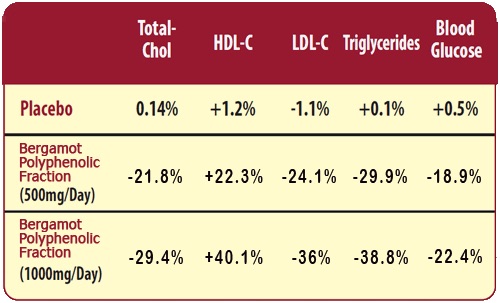
The effect of Bergamot Polyphenolic Fraction (500 and 1000 mg/daily) on reactive vasodilatation in patients suffering from isolated (HC) or mixed hyperlipidemia (HC/HT) and associated hyperglycemia (HC/HT /HG).
Bergamot Polyphenolic Fraction reduces total and LDL cholesterol levels (an effect accompanied by elevation of cHDL), triglyceride levels and by a significant decrease in blood glucose. Moreover, it inhibited HMG-CoA reductase activity and enhances reactive vasodilation.
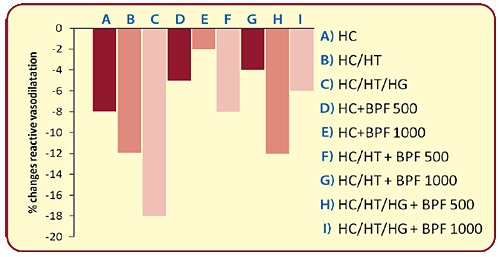
Supports healthy cholesterol level†, increase LOX-1 expression and Protein Kinase B phosphorylation
International Journal of Cardiology, 2013
In this open-label, parallel group, placebo-controlled study, 77 patients were randomly assigned either placebo, Rosuvastatin, Bergamot Polyphenolic Fraction or combination of Bergamot Polyphenolic Fraction with Rosuvastatin for 30 days.
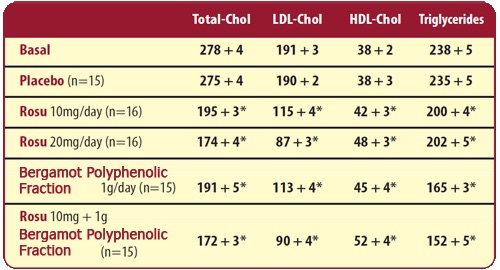
Both doses of rosuvastatin and Bergamot Polyphenolic Fraction help support healthy cholesterol level† and reduce urinary mevalonate compared to control group. The benefits are associated with significant reductions of biomarkers used for detecting oxidative vascular damage, including malondialdehyde, oxyLDL receptor LOX-1 and phosphoPKB.
Effects on LDL Small Dense Particles, Metabolic Biomarkers, and Liver Function
Advances in Biological Chemistry, 2014, 4, 129-137
107 patients with metabolic syndrome and non fatty liver disease were given either placebo or 650 mg of Bergamot Polyphenolic Fraction twice a day for 120 days. Bergamot Polyphenolic Fraction group showed significant reduction in fasting plasma glucose, rotal cholesterol, LDL cholesterol, triglycerides, and increase of HDL cholesterol. Bergamot Polyphenolic Fraction decrease IDL particles by 51%, increase large LDL by 38%, decrease small LDL by 35%, and 20% increase of total HDL particles. Hepatorenal index was significantly reduced by 46%, accompanied by reduction of hepatic ultrosonographic pattern of steatosis by 99%. This suggests Bergamot Polyphenolic Fraction improves both liver function and inflammation as confirmed by reduction of TNF-α and CRP.
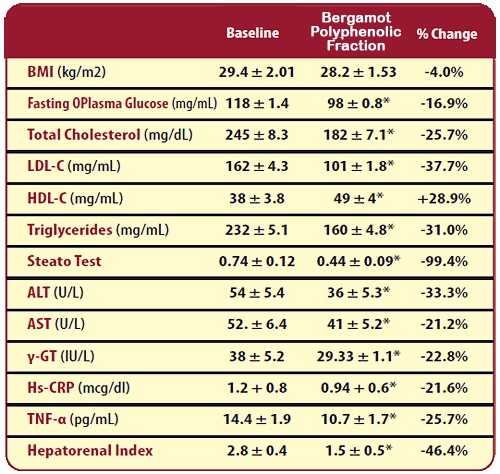
Product Comparison

† Already within the normal range
References (The research was performed using BPF, produced by H&AD SRL)
- Ross Walker, Elzbieta Janda and Vincenzo Mollace. The Use of Bergamot-derived Polyphenol Fraction in Cardiometabolic Risk Prevention and its Possible Mechanisms of Action. Cardiac Health and Polyphenols. Chp 84, Pg 1085-1103, 2014
- Micaela Gliozzi, Ross Walker, Elzbjeta Janda, Vincenzo Mollace. Bergamot polyphenolic fraction enhances rosuvastatin-induced effect on LDLcholesterol, LOX-1 expression and Protein Kinase B phosphorylation in patients with hyperlipidemia. International Journal of Cardiology Dec 2013, 170(2):140-5
- Vincenzo Mollace, Iolanda Sacco, Elzbieta Janda, Claudio Malara, Domenica Ventrice, Carmen Colica, Valeria Visalli, Saverio Muscoli. Hypolipemic and hypoglycaemic activity of bergamot polyphenols: From animal models to human studies. Fitoterapia 82 (2011) 309–316
- Celia C, Trapasso E, Locatelli M, Navarra M, Ventura CA, Wolfram J, Carafa M, Morittu VM, Britti D, Di Marzio L.. Anticancer activity of liposomal bergamot essential oil (BEO) on human neuroblastoma cells. Colloids Surf B Biointerfaces. 2013 Dec 1;112:548-53
- Delle Monache S, Sanità P, Trapasso E, Ursino MR, Dugo P, Russo M, Ferlazzo N, Calapai G, Angelucci A, Navarra M. Mechanisms underlying the anti-tumoral effects of Citrus Bergamia juice. PLoS One. 2013 Apr 16;8(4)
- Kang P, Suh SH, Min SS, Seol GH. The essential oil of Citrus bergamia Risso induces vasorelaxation of the mouse aorta by activating K(+) channels and inhibiting Ca(2+) influx. J Pharm Pharmacol. 2013 May;65(5):745-9
- Leopoldini M, Malaj N, Toscano M, Sindona G, Russo N. On the inhibitor effects of bergamot juice flavonoids binding to the 3-hydroxy-3-methylglutaryl-CoA reductase (HMGR) enzyme. J Agric Food Chem. 2010 Oct 13;58(19):10768-73
- Di Donna L, De Luca G, Mazzotti F, Napoli A, Salerno R, Taverna D, Sindona G. Statin-like principles of bergamot fruit (Citrus bergamia): isolation of 3-hydroxymethylglutaryl flavonoid glycosides. J Nat Prod. 2009 Jul;72(7):1352-4
- Mollace V, Ragusa S, Sacco I, Muscoli C, Sculco F, Visalli V, Palma E. The protective effect of bergamot oil extract on lecitine-like oxyLDL receptor-1 expression in balloon injury-related neointima formation. J Cardiovasc Pharmacol Ther. 2008 Jun;13(2):120-9
- Natalizia Miceli, Maria Mondello, Maria Mondorte, Vasileios Sdrafkakis, Paola Dugo, Maria Crupi. Hypolipidemic effects of bergamot juice in rats Fed a Hypercholesterolemic Diet. J. Agric. Food Chem., Vol. 55, No. 26, 2007
HPI's Custom Formulations
HP Ingredients offers custom formulations and private labeling services to manufacturers. HPI’s innovation in formulations is accomplished by combining our trademarked ingredients with other clinically tested, well-researched nutraceuticals.
